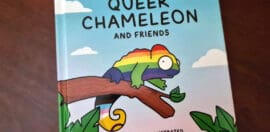Is now the time for a universal basic income?

9 March 2021 at 8:35 am
New documentary, Inherent Good, explores the power of unconditional cash and an economy in which no one’s income starts at zero.
When Steve Borst and Rennie Soga first set out to make Inherent Good in 2017, the conversation around universal basic income was still very fringe.
The idea of making regular cash payments to every citizen – no strings attached – to ensure that no one falls below the poverty line, was, and still is, considered radical.
But as the world continues to fight a health pandemic, and economies globally are pushed into recession, holes in our current safety nets are becoming exposed. More and more people are questioning the systems that we live in.
Against this backdrop, the documentary seems very timely.
Over 60-minutes, Inherent Good presents UBI as a vehicle to transform the American economy into one that is “thriving, sustainable, and centred around the well-being of all people”.
It has the potential to lift 40 million Americans out of poverty, create $2.5 trillion in economic growth in the US and create 4.5 million jobs. US$1,000 a month also hands a sense of agency back to those on welfare.
At the centre of the film, is comedian Trae Crowder, a.k.a. “The Liberal Redneck”, who returns to his rural hometown of Celina, Tennessee, to explore the core tenets behind UBI and the difference it could make to the citizens there.
He describes the impact of growing up living pay cheque to pay cheque – “knowing you’re on the precipice of ruin all the time”.
We hear stories from those living in Celina – a town which has struggled since the clothing factory, and its main employer, shut its doors decades ago.
These stories are told alongside firsthand accounts from participants in a basic income pilot program, The Magnolia Mother’s Trust, launched in Jackson, Mississippi, for Black mothers living in poverty.
The film also features former US presidential candidate Andrew Yang, who ran on a platform of UBI in 2020, proposing to give $1,000 per month to every citizen between the ages of 18 to 64, in what he dubs the “freedom dividend”.

Both Borst and Soga agree their timing has been somewhat serendipitous, with the making of the documentary coinciding with a growing movement.
Producer Soga first came across the concept of UBI in her “previous life” working in the tech industry. It was an idea she discussed with colleagues over drinks.
“We were very aware that we were automating away a bunch of jobs and that was really shifting what the labor market was looking like,” Soga tells Pro Bono News.
“We were also aware of the wealth inequality that was going on in the States. It really spoke to me.”
After making the shift into the world of activism, she decided to do a documentary on the subject in a bid to move the conversation forward. Along with producing partner Chris Panizzon, she started researching more about UBI, before approaching her partner Borst, to come on board as director.
Borst – a two-time Emmy-nominated television writer and producer most known for co-creating Nickelodeon’s Breadwinners – recalls the more he started to learn about UBI, the more it made sense to him.
“When you start going deeper it opens up philosophical discussions about how we structure society and how we distribute our resources, and so for me it just opened up a whole plethora of reasons for why it was a good idea,” he says.
Not only do they see it as a good idea, the pair believe now could be the time for UBI.
“I think there has been this prevailing narrative that resources are distributed according to these imaginary laws governed by a meritocracy where everybody gets what’s due to them, but I think those narratives are really falling apart,” Borst says.
“Especially when you see during this pandemic people who were struggling financially, struggling even more, and then wealthy people just become more phenomenally wealthy.
“I think it is time for us to really take a look at how resources are distributed. I think a universal basic income would bring a lot of peace of mind to people so that they don’t have to just be hoping the government will give out another cheque.”
But while the film makes a clear case in support of UBI, the concept is not without opposition.

A very real concern with UBI is what it could do for people’s existing benefits.
Any increase in income – such as the cash received as part of a UBI – can lead to a decrease in benefits. This was the case for some of the participants in the pilot program in Jackson.
“I think that is particularly problematic for subsidised housing,” Borst says.
“So that has to be looked at. You do not want people who are struggling to not get the most advantage from this program.
“That is the sort of poverty trap that is baked into the current programs as it is – anytime you get an income increase your benefits go down so it is harder to get ahead.”
Some of the other barriers to UBI are more psychological. One of the central tenets of the documentary is the question of trust. Do we trust each other enough?
This plays out in some of the common fears of UBI that people will stop working or misuse the money.
At a town hall in Celina, a pastor stands and talks about how the idea of UBI is based on the presumption that people are inherently good – something that rang true for Borst and Soga, and led to the title of the film.
Borst says it is these psychological roadblocks that are holding us back from a UBI.
He points to the challenge of overcoming narratives ingrained in capitalist societies that stress the importance of earning your money.
“Particularly in our country over the last 40 years the welfare system has really been demonised and gutted so people see UBI and have a knee-jerk response, ‘oh that’s a handout, who’s paying for that?’,” he says.
He says the documentary was very much an experiment in how to talk to people about this idea.
“Really, I think it’s about persuading people that this idea actually is in line with their beliefs,” he says.
“I think that’s why we’re stressing the idea of ‘infrastructure for families’, because I think that that is something that everyone can agree on, that we should be investing in families.”
For Soga, it is a question of telling more stories and highlighting what we all have in common.
“I’m hoping with more stories, like Inherent Good, that reflect those lived experiences and shared values, that people will start to see each other more and build more trust. But it is a long arc and a lot of work especially given the political climate we are in,” she says.
To ensure the documentary achieves its impact goal and supports the growing movement, the team has partnered with grassroots organisations Income Movement and Humanity Forward that are pushing for a universal basic income at a federal level.
They are also working to get the film in front of audiences in rural communities, which could stand to benefit the most from a UBI, and focusing on college youth, trying to get the film into classrooms and onto curriculums.
Borst says for him it is a question of playing the long game.
“I would like [UBI] now but if it happens later, if it requires that much of a shift in thinking then bringing it to college students is one way to achieve that longer goal,” he says.
On the question of trust, Borst remains optimistic, but admits the point could become moot.
“Because it might become completely necessary to implement something like this,” he says. “If wealth inequality continues to go at the rate that it is going at, it will become an undeniable truth that people do not have access to cash. It will simply become a necessity.”
Pro Bono Australia is presenting the film Inherent Good as part of the Transitions Film Festival. To learn more or purchase tickets, head to the Transitions Film Festival website.








Pie in the sky, being pushed by armchair ‘socialists’ and academics. Not only foolish but positively counter productive when most governments will not even look at improving the ‘social benefit’ for the bottom 10% who really need it. Takes focus off the actual important reality of poor people in an otherwise rich country.
UBI trials around the world have proven significant social benefits, health improves, education improves, drug use lowers crime lowers. The economy is at the end stage of a game of monopoly and a reset needs to occur. Our society calls itself educated, refined ‘the developed world”, yet we structurally create poverty. Money is printed so print it and give enough to everyone to meet basic needs. And no, people in UBI trials do not sit at home and not work. They actually improve their situation form a financial foundation. Read Rutger Bregmans Utopia for realists or Andrew Yangs the War on Common People.